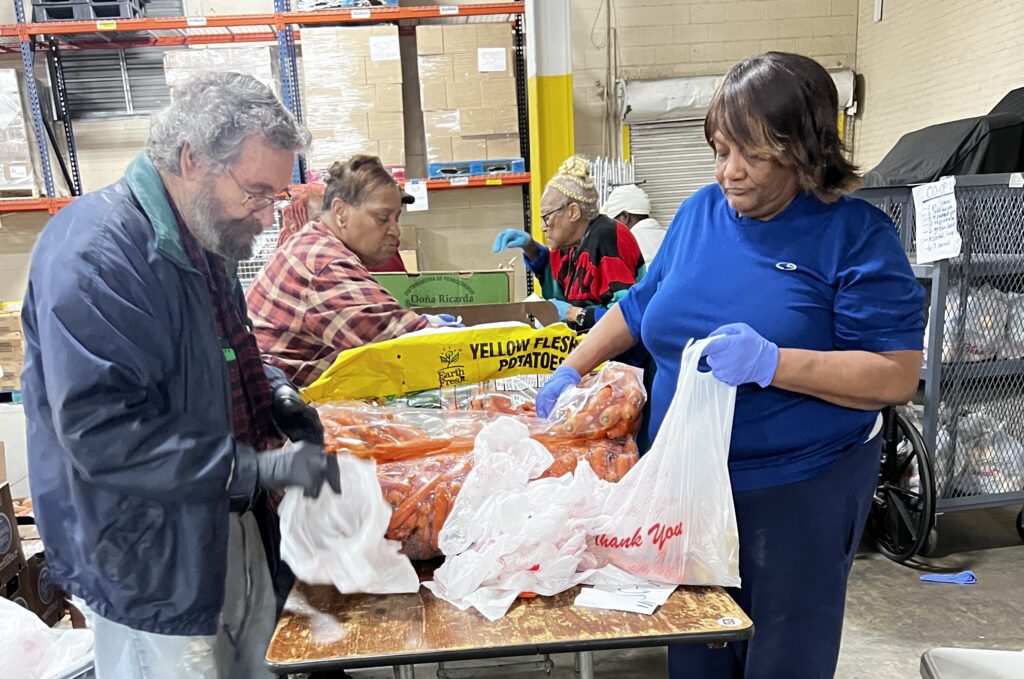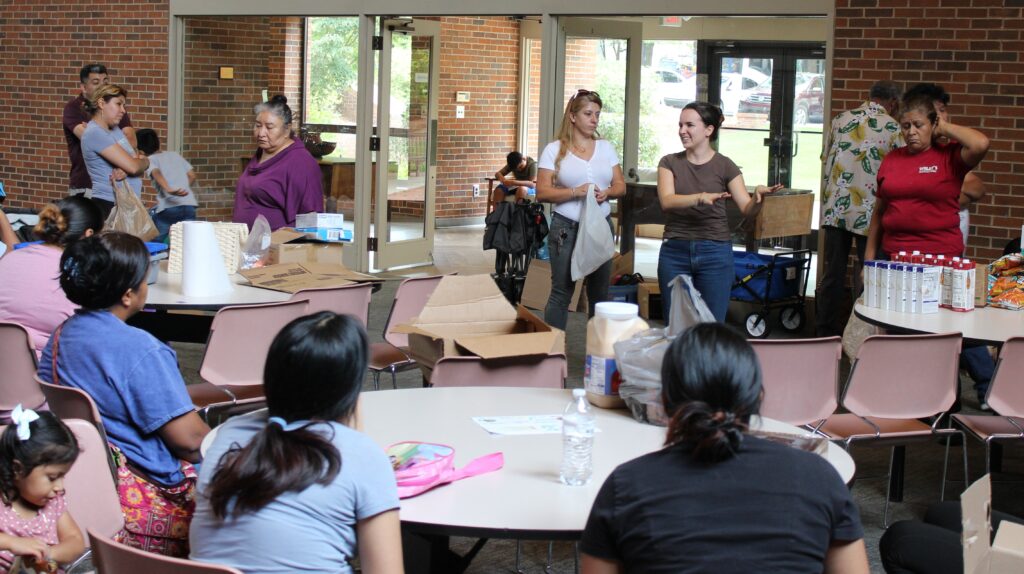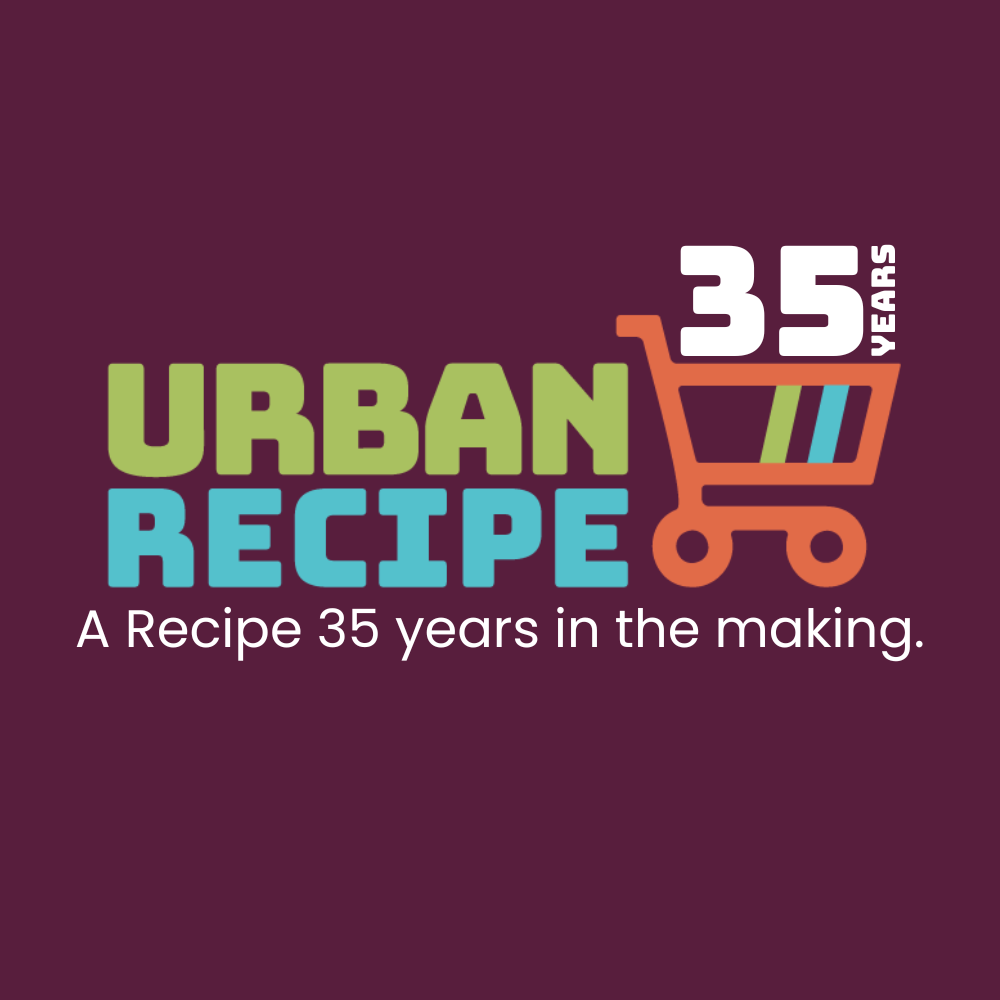Though Urban Recipe has been running food co-ops in Atlanta for over 30 years, the concept of a food cooperative can be hard to grasp. Some parts of a co-op are straightforward: each co-op meets at a recurring location, at the same time bi-weekly, a total of 26 times annually. The food comes from Urban Recipe, sourced from around Atlanta, from food partners like the Atlanta Community Food Bank, Second Helpings Atlanta, Common Market, and other places. The food rolls up in the Urban Recipe truck, arriving at the co-op locations – schools, churches, community centers, residential communities – and co-op members and staff alike help offload the supplies.
Co-op members are also consistent. After attending orientation, the co-op members return to their same co-op, forming relationships within that co-op and maintaining a regular schedule.
But what happens at the co-op meeting? What does it mean to be part of an Urban Recipe food co-op?

What does a Food Co-op meeting look like?
Co-op members can anticipate the structure of a co-op to include similar components, but each co-op runs a bit differently. Every co-op shares a similar structure:
- Check-in. Upon arrival, co-op members sign in on the roster. All members have attended orientation and filled out paperwork prior to their first meeting, and signing in helps staff track attendance, participation and family size.
- Volunteer. Co-op members collaborate and volunteer within the co-op as they are able. Members can help with a variety of tasks:
- Set up: Members set up tables, pull out supplies, and ready the space for co-op. They open grocery bags and boxes and prepare for the food sort.
- Non-perishable boxes: Members unload the pallet that Urban Recipe provides, unboxing canned goods and other shelf stable items. They sort these items into bins for each co-op member to take home based on the size of their family.
- Frozen boxes: Similar to the non-perishable boxes, co-op members assist in sorting frozen food from Urban Recipe into the appropriate number of bins. Frozen food is handled with care, staying at room temperature only in small increments to ensure food safety.
- Produce sorting: Most weeks, co-ops receive produce, which members sort through, making sure it is in good condition before bagging it for each family to take home.
- Organizing the choice table: Most co-ops opt to take any specialty or excess items (like limited snacks or home goods) and organize them on a choice table for members to select later. Some co-ops decide to randomly distribute these items instead, but ensure excess is distributed equitably.
- Breaking down boxes: Some co-op members help break down all the cardboard boxes that are emptied by the other members. They prepare these to be brought to the trash and recycling bins.
- Cleaning: Co-op members clean as they go, wiping down bins and tables and sweeping as messes occur. They empty the trash and recycling and discard any unsafe food products. At the end of the co-op meeting, all the supplies are stored neatly and the room is tidied.
- General Assembly. Following the volunteer time, the co-op’s steering committee, comprised of an elected President, Vice President, Secretary and Vice Secretary, runs a general assembly meeting with all of the members. This meeting is to share ideas for the co-op, lead votes on proposed adjustments to the co-op, celebrate birthdays and other special events, and receive input from co-op members. Every co-op runs its general assembly meeting differently, with some co-ops using language interpreters to ensure everyone can understand and participate in the co-op.
- Choice Table. Some weeks, co-ops have a choice table, with excess items from which co-op members can choose. Typically co-op members can take home a set number of items, making sure there is enough for everyone. Each co-op runs its choice table a bit differently!
- Distribution. Each co-op ends its co-op meeting with the food distribution, where members receive the food that was set aside for them earlier. Co-ops differ slightly on food distribution, some helping other members pack up food, some calling members one at a time with a list, but all co-ops make sure food is sent home equitably.

No two co-op meetings are exactly the same, as they are filled with diverse and varied groups of people. Some weeks there is a surplus of food and it is easy to share. In other weeks, high-priority items are more limited and co-op members must problem-solve and communicate respectfully with one another, problem-solving with care in mind.
Every Urban Recipe co-op meeting is staffed with a coordinator to help guide the members. As with any activity, unexpected challenges, celebrations, problems, and opportunities arise, and having a staff member is vital to ensure Urban Recipe food co-op standards are met at all times.
Every co-op meeting is a unique opportunity for members to serve one another, serve with one another, and fight food insecurity in their families and communities in Atlanta.




